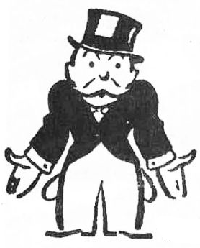 A couple of interesting pieces on the Authors United matter popped up today. In the New Yorker, Vauhini Vara looks at the united authors’ arguments put forward in their letter. Calling those arguments “highly unorthodox,” she goes over them with the help of some anti-trust experts.
A couple of interesting pieces on the Authors United matter popped up today. In the New Yorker, Vauhini Vara looks at the united authors’ arguments put forward in their letter. Calling those arguments “highly unorthodox,” she goes over them with the help of some anti-trust experts.
The rationale for the unorthodox tactic is, of course, the change in the way the courts have interpreted anti-trust law over the years. Whereas they used to focus on companies harming their suppliers, they have gradually drifted away from that in favor of giving supplier-harming companies a pass if their actions benefited the consumer, as with lower prices.
As a result, in order to have any hope of the Department of Justice taking up their cause, Authors United is making the argument that, in reducing book prices to benefit consumers, Amazon is actually harming consumers in the long run. (This gives me the image of consumers being a little kid who wants to gorge on candy and spoil their appetite.) The question is, will it work?
One of the cases cited by her experts is the Leegin vs. McKay decision, which was also heavily involved in the Apple anti-trust affair. (It was a favorite source of citations for Bob “Let Me Draw You Some Pictures” Kohn, too.) The outcome of that decision was to permit resale price maintenance—suppliers could insist their goods sell for more if it led to making better goods. Could Amazon selling books for less lead to lousier books? That certainly doesn’t seem to be the case for self-publishers, who are uniformly charging less than the Big Five and more or less eating their collective lunch. Sure, some of them are lousy, but apparently not the ones who are making the big money and doing the lunch-eating.
None of this is to suggest, however, that the Department of Justice would have a strong case against Amazon if it were to sue the company and apply Authors United’s reasoning. One reason pricing has been such a popular method of measuring consumer welfare is that it’s easy to quantify: a three-dollar jar of peanut butter is objectively better for consumers than the exact same jar priced at five dollars—forty per cent better. While it may be attractive, on a philosophical level, to argue that Amazon is bad for us because it makes our culture poorer, measuring that effect would be difficult, if not impossible. How would one go about valuing an unpublished masterpiece by an unknown author? This is further complicated by the fact that Amazon makes it easy for authors to self-publish and have their work be seen, without having to go through such traditional gatekeepers as agents and publishers; Amazon might argue that this allows for more free flow of information and ideas. Furthermore, U.S. law is concerned with diversity in media, [University of Michigan Law School anti-trust expert Daniel] Crane said, but that tends to be regulated through the Federal Communications Commission, not the Justice Department.
Vara effectively concludes that we’ll just have to wait and see how it goes.
The other interesting piece that came to light was an analysis by author Randy Morris. While not a lawyer himself, he pointed out that the Authors United writers admitted not to be legal experts either, so he figured that gave him as much right to comment as they did. Taking the arguments in the letter as if they were arguments made before a court, Morris stepped through them one by one to explain why they probably wouldn’t hold much water. (Found via The Passive Voice.)
The first tricky point was how Authors United didn’t really explain what market they were accusing of Amazon of monopolizing. Paper books? E-books? Books in general? This was a sticking point for the one anti-trust case brought directly against Amazon in the past, Bookhouse of Stuyvesant Plaza, Inc. v. Amazon.com, Inc..
The judge noted that “without more detailed allegations or explanation, the Court cannot reasonably infer that these two markets simultaneously are so different that e-books and print books are not acceptable substitutes, and yet so similar that the Publishers’ market share is the same in both markets.” AU’s letter does allege a different market share for print book sales, but the two numbers seem to be close enough that it should at least be an open question as to whether we’re looking at a U.S. market for books or two markets – e-books and print books. AU has still not addressed the issue of whether e-books and print books are acceptable substitutes for one another.
Then comes the question of exactly what constitutes a “monopoly.” What percentage of the market do you have to have? Controlling a majority of but not the entire market is not enough by itself—you also have to have “an ability to control prices or exclude competition.” Even if Amazon does control 65% of the e-book market and 75% of the print book market, it can’t keep other people from starting new retailers.
Another problem for AU is that a company can’t be an illegal monopoly if they get that market share “as a consequence of a superior product, business acumen, or historic accident.” Which pretty much describes the Kindle and Bezos’s marketing skill right there.
AU’s claim that Amazon has blocked book sales to put pressure on publishers runs into trouble because no business has a “duty to aid competitors.” It isn’t a good idea to force businesses that build their own unique infrastructure to serve their customers to share that advantage with others, because that makes it less likely those others will build their own competing solution.
AU’s claim Amazon has used its power to extract a greater share of books’ revenue from publishers runs into the problem of “economic duress”—for that duress to take place, there has to be a “wrongful act” involving “fraud or wrongdoing” inducing the entity under duress to enter the contract—and that doesn’t count “hard bargaining positions or the pressure of financial circumstances.” If AU has any evidence Amazon committed “fraud or wrongdoing,” they haven’t shown it. Morris adds:
I don’t think any of the Big 5 entered into a contract with Amazon that they were forced into, but if there was fraud or wrongdoing involved, the remedy is to void the contact. I imagine none of the Big 5 want their contracts with Amazon voided, but they can make a duress argument in court if I’m wrong.
The longest section of the essay goes into AU’s “predatory pricing” argument—fair enough, given that there’s already been so much said about that during the Apple anti-trust affair. To sum up, to be a predatory pricer, Amazon would have to be specifically targeting competitors with its low prices, and intend to jack those prices up again once it drove its competitors out of business. There’s just no sign of that, because Amazon has always thrived by keeping its prices low and its margins razor-thin. Any profits it makes, it pours right back into something else.
Finally, AU’s concern on behalf of poor benighted self-published authors, who are subject to Amazon’s rate payment whims, run into the problem of Authors United not having any of those self-published authors in its membership, so lacking standing to bring suit on their behalf. This is, of course, why they’re not bringing suit, but trying to get the Department of Justice interested in investigating.
In fact, the overall shakiness of the case—which Preston actually admits in some sense to the New Yorker’s Vara (“Not being a lawyer, maybe they’re right—maybe we’re barking up the wrong tree.”)—is probably why Authors United or someone like them isn’t trying to bring this suit themselves.
I’ve discussed the Robinson-Patman Act before (“I’m Patman.”) in that context—back in the ‘90s, the American Booksellers Association used it to launch a series of suits against incumbent bookstore chains and publishers. It was simple, because they had an open-and-shut case and they knew it—they were able to rack up an impressive tally of judgments and consent decrees. But with the Amazon affair, nobody wants to bell the cat. Not the ABA, not the Authors Guild, not Authors United, not the major publishing houses on whose behalf Authors United are so concerned (who should certainly be able to afford their own lawyers). They all want the Department of Justice to do it.
The publishers, of course, don’t want to make it even harder for themselves to get a good deal out of Amazon. Just look how many months the Hachette wrangle went on, and that was on relatively good terms.
Then there are the others, such as the ABA. You’d think anyone who was willing to sue Barnes & Noble at the height of its independent-bookstore-destroying power, and several major publishers besides, wouldn’t scruple at taking on Amazon now. Even the Authors Guild and Authors United have plenty of millionaire trad-pubbed authors who should be able to bear the brunt of the legal fees between them if they felt like putting that money where their mouths were and taking Amazon to court. (Of course, they’d have to contend with Amazon possibly no longer deciding to carry their books if they did that—but hey, they’re already millionaires, right?)
But then there’s the matter of those bookstores who actually tried it, Bookhouse of Stuyvesant Plaza. That acted as a pretty blatant dry run of some of the very same legal arguments they’d have to make if they brought suit against Amazon, and the judge simply wasn’t impressed. So now they’re trying to get the Department of Justice to do their dirty work for them.
As I’ve said before, the DoJ has already investigated Amazon for predatory pricing once. They found Amazon’s book sales to be “consistently profitable,” and Bob Kohn was never successful in convincing Judge Cote to force them to open up the results of that investigation. Something tells me Authors United is going to have a hard row to hoe.

































Great piece, Chris. Thanks for reminding us of some of the history behind the issue.
The original article is a welcome departure from the usual Amazon-bashing fare. Ms Vara presents different viewpoints and avoids sneakily-biased language. How refreshing. It’s like…dare I say it…journalism.